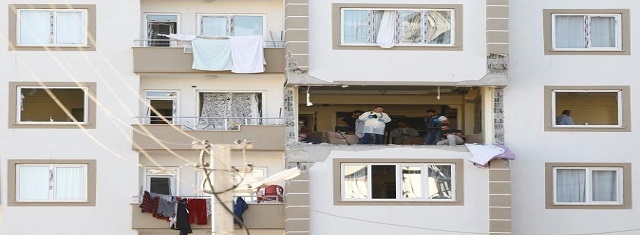News
Suicide bomber kills three police officers in southern Turkey
WORLD NEWS

Police forensic experts examine an apartment
USPA NEWS -
A suicide bomber killed three police officers and wounded at least nine people in the southern Turkish city of Gaziantep on Sunday during a police raid on a suspected Islamic State safehouse, a local official and security sources said.
The bomber detonated explosives as police raided the house in the Besyuzevler neighbourhood of the city, some 40 km (25 miles) from the Syrian border, Abdullah Nejat Kocer, a local member of parliament from the ruling AK Party, told reporters.
A second suicide bomber detonated explosives during another police raid related to the same investigation at an apartment in the city's Gazikent suburb, but no other people were killed, a police official at the scene said. That blast blew the front wall out of the building, according to a Reuters witness.
A second suicide bomber detonated explosives during another police raid related to the same investigation at an apartment in the city's Gazikent suburb, but no other people were killed, a police official at the scene said. That blast blew the front wall out of the building, according to a Reuters witness.
Kocer said three police officers were killed in the Besyuzevler blast. Six of the wounded were also police, two of them left in a critical condition in hospital. The three other people wounded were Syrian nationals, Kocer told reporters.
Security sources said police had pursued a vehicle believed to be carrying explosives to the house, where a group of Syrian nationals were thought to be sheltering, before raiding it.
Turkey has seen a spate of suicide bombings by militants suspected of links to Islamic State. A suicide bomb killed more than 50 people, many of them children, at a Kurdish wedding in Gaziantep in August.
Security sources said police had pursued a vehicle believed to be carrying explosives to the house, where a group of Syrian nationals were thought to be sheltering, before raiding it.
Turkey has seen a spate of suicide bombings by militants suspected of links to Islamic State. A suicide bomb killed more than 50 people, many of them children, at a Kurdish wedding in Gaziantep in August.
Turkey launched an incursion into Syria in August in support of Syrian rebels to try to push Islamic State from its border. The rebels said on Sunday they had captured the village of Dabiq from the jihadist group, a stronghold where it had promised to fight a final, apocalyptic battle with the West.
Turkish security forces have repeatedly raided houses in Istanbul, Gaziantep and other cities in a crackdown on suspected jihadists linked to Islamic State.
Turkish security forces have repeatedly raided houses in Istanbul, Gaziantep and other cities in a crackdown on suspected jihadists linked to Islamic State.
Liability for this article lies with the author, who also holds the copyright. Editorial content from USPA may be quoted on other websites as long as the quote comprises no more than 5% of the entire text, is marked as such and the source is named (via hyperlink).





